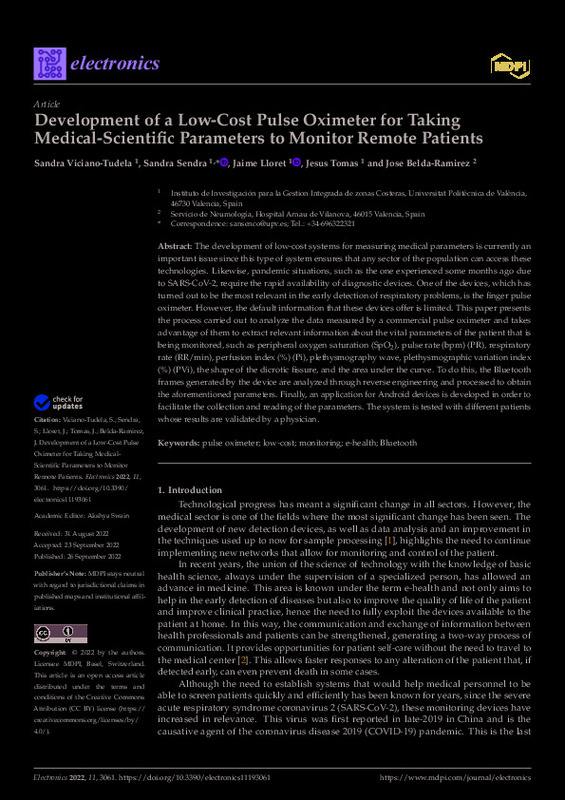JavaScript is disabled for your browser. Some features of this site may not work without it.
Buscar en RiuNet
Listar
Mi cuenta
Estadísticas
Ayuda RiuNet
Admin. UPV
Development of a Low-Cost Pulse Oximeter for Taking Medical-Scientific Parameters to Monitor Remote Patients
Mostrar el registro sencillo del ítem
Ficheros en el ítem
| dc.contributor.author | Viciano-Tudela, Sandra
|
es_ES |
| dc.contributor.author | Sendra, Sandra
|
es_ES |
| dc.contributor.author | Lloret, Jaime
|
es_ES |
| dc.contributor.author | Tomás Gironés, Jesús
|
es_ES |
| dc.contributor.author | Belda-Ramirez, Jose
|
es_ES |
| dc.date.accessioned | 2023-03-28T18:00:45Z | |
| dc.date.available | 2023-03-28T18:00:45Z | |
| dc.date.issued | 2022-09-26 | es_ES |
| dc.identifier.uri | http://hdl.handle.net/10251/192640 | |
| dc.description.abstract | [EN] The development of low-cost systems for measuring medical parameters is currently an important issue since this type of system ensures that any sector of the population can access these technologies. Likewise, pandemic situations, such as the one experienced some months ago due to SARS-CoV-2, require the rapid availability of diagnostic devices. One of the devices, which has turned out to be the most relevant in the early detection of respiratory problems, is the finger pulse oximeter. However, the default information that these devices offer is limited. This paper presents the process carried out to analyze the data measured by a commercial pulse oximeter and takes advantage of them to extract relevant information about the vital parameters of the patient that is being monitored, such as peripheral oxygen saturation (SpO2), pulse rate (bpm) (PR), respiratory rate (RR/min), perfusion index (%) (Pi), plethysmography wave, plethysmographic variation index (%) (PVi), the shape of the dicrotic fissure, and the area under the curve. To do this, the Bluetooth frames generated by the device are analyzed through reverse engineering and processed to obtain the aforementioned parameters. Finally, an application for Android devices is developed in order to facilitate the collection and reading of the parameters. The system is tested with different patients whose results are validated by a physician. | es_ES |
| dc.description.sponsorship | This work has been partially funded by the "La Fundacion para el Fomento de la Investigacion Sanitaria y Biomedica de la Comunitat Valenciana (Fisabio)" through the Project PULSIDATA (A43). | es_ES |
| dc.language | Inglés | es_ES |
| dc.publisher | MDPI AG | es_ES |
| dc.relation.ispartof | Electronics | es_ES |
| dc.rights | Reconocimiento (by) | es_ES |
| dc.subject | Pulse oximeter | es_ES |
| dc.subject | Low-cost | es_ES |
| dc.subject | Monitoring | es_ES |
| dc.subject | E-health | es_ES |
| dc.subject | Bluetooth | es_ES |
| dc.subject.classification | INGENIERÍA TELEMÁTICA | es_ES |
| dc.title | Development of a Low-Cost Pulse Oximeter for Taking Medical-Scientific Parameters to Monitor Remote Patients | es_ES |
| dc.type | Artículo | es_ES |
| dc.identifier.doi | 10.3390/electronics11193061 | es_ES |
| dc.rights.accessRights | Abierto | es_ES |
| dc.contributor.affiliation | Universitat Politècnica de València. Escuela Politécnica Superior de Gandia - Escola Politècnica Superior de Gandia | es_ES |
| dc.contributor.affiliation | Universitat Politècnica de València. Instituto de Investigación para la Gestión Integral de Zonas Costeras - Institut d'Investigació per a la Gestió Integral de Zones Costaneres | es_ES |
| dc.description.bibliographicCitation | Viciano-Tudela, S.; Sendra, S.; Lloret, J.; Tomás Gironés, J.; Belda-Ramirez, J. (2022). Development of a Low-Cost Pulse Oximeter for Taking Medical-Scientific Parameters to Monitor Remote Patients. Electronics. 11(19). https://doi.org/10.3390/electronics11193061 | es_ES |
| dc.description.accrualMethod | S | es_ES |
| dc.relation.publisherversion | https://doi.org/10.3390/electronics11193061 | es_ES |
| dc.type.version | info:eu-repo/semantics/publishedVersion | es_ES |
| dc.description.volume | 11 | es_ES |
| dc.description.issue | 19 | es_ES |
| dc.identifier.eissn | 2079-9292 | es_ES |
| dc.relation.pasarela | S\485252 | es_ES |
| dc.contributor.funder | Fundación para el Fomento de la Investigación Sanitaria y Biomédica de la Comunitat Valenciana | es_ES |








